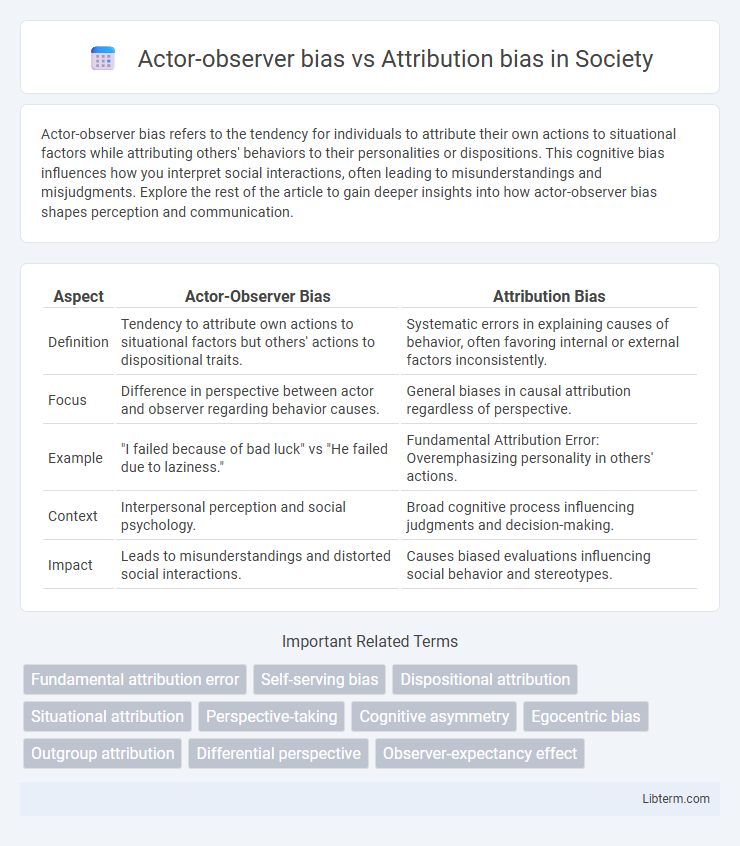Actor-observer bias refers to the tendency for individuals to attribute their own actions to situational factors while attributing others' behaviors to their personalities or dispositions. This cognitive bias influences how you interpret social interactions, often leading to misunderstandings and misjudgments. Explore the rest of the article to gain deeper insights into how actor-observer bias shapes perception and communication.
Table of Comparison
| Aspect | Actor-Observer Bias | Attribution Bias |
|---|---|---|
| Definition | Tendency to attribute own actions to situational factors but others' actions to dispositional traits. | Systematic errors in explaining causes of behavior, often favoring internal or external factors inconsistently. |
| Focus | Difference in perspective between actor and observer regarding behavior causes. | General biases in causal attribution regardless of perspective. |
| Example | "I failed because of bad luck" vs "He failed due to laziness." | Fundamental Attribution Error: Overemphasizing personality in others' actions. |
| Context | Interpersonal perception and social psychology. | Broad cognitive process influencing judgments and decision-making. |
| Impact | Leads to misunderstandings and distorted social interactions. | Causes biased evaluations influencing social behavior and stereotypes. |
Understanding Actor-Observer Bias
Actor-observer bias occurs when individuals attribute their own actions to situational factors but attribute others' behaviors to dispositional traits, highlighting a discrepancy in perspective. Understanding actor-observer bias is crucial for accurate social perception and reducing misunderstandings in interpersonal communication. This bias differs from general attribution bias, which broadly covers errors in attributing causes of behavior without distinguishing between self and others.
Defining Attribution Bias
Attribution bias refers to the systematic errors individuals make when inferring the causes of their own and others' behaviors, often leading to distorted judgments. Actor-observer bias is a specific type of attribution bias where people attribute their own actions to situational factors while attributing others' behaviors to dispositional traits. Understanding attribution bias is essential in social psychology for analyzing how people perceive and explain behavior in interpersonal contexts.
Key Differences Between Actor-Observer Bias and Attribution Bias
Actor-observer bias involves the tendency to attribute one's own actions to situational factors while attributing others' behaviors to their dispositions, highlighting a difference in perspective based on the actor or observer role. Attribution bias is a broader category encompassing various cognitive biases that affect how individuals assign causes to events or behaviors, including fundamental attribution error and self-serving bias. The key difference lies in actor-observer bias specifically addressing perspective-based attribution discrepancies, whereas attribution bias includes a range of biases influencing causal interpretations more generally.
Psychological Roots of Actor-Observer Bias
Actor-observer bias stems from fundamental differences in perspective, where actors attribute their own actions to situational factors while observers emphasize dispositional traits. This bias is rooted in cognitive processes such as perceptual salience, where individuals focus on external environments when explaining their own behaviors and on internal characteristics when judging others. Attribution bias broadly encompasses errors in inferring causes of behavior, but actor-observer bias specifically highlights how self-awareness and external context shape distinct explanations.
Attribution Bias: Causes and Examples
Attribution bias refers to systematic errors made when people evaluate or try to find reasons for their own and others' behaviors, often leading to distorted perceptions. Causes of attribution bias include cognitive shortcuts like the fundamental attribution error, where individuals attribute others' actions to personality traits rather than situational factors, and self-serving bias, where people credit successes to internal factors and blame failures on external circumstances. Examples of attribution bias occur when a manager blames an employee's poor performance on laziness (dispositional attribution) instead of considering external challenges like workload or insufficient training (situational attribution).
Real-World Scenarios Illustrating Both Biases
Actor-observer bias emerges in real-world scenarios when individuals attribute their own actions to situational factors but others' actions to dispositional traits, such as a driver blaming traffic for their lateness while assuming another driver's tardiness stems from carelessness. Attribution bias broadly encompasses errors like the fundamental attribution error, where observers disproportionately attribute others' behaviors to personality rather than context, influencing judgments in workplace evaluations and legal settings. Both biases impact social interactions and decision-making by distorting perceptions of responsibility and intent based on whether one is the actor or observer.
Impact on Interpersonal Relationships
Actor-observer bias influences interpersonal relationships by causing individuals to attribute their own negative behaviors to external circumstances while attributing others' negative behaviors to personal traits, leading to misunderstandings and conflicts. Attribution bias, encompassing errors like fundamental attribution error, further distorts perceptions by emphasizing dispositional factors over situational ones, thereby impairing empathy and communication in social interactions. Both biases reduce the accuracy of social judgments, fostering mistrust and weakening relational bonds.
Cultural Influences on Attribution Patterns
Cultural influences significantly affect attribution patterns, with individualistic cultures displaying stronger actor-observer bias by attributing others' behavior to dispositional factors while emphasizing situational causes for themselves. Collectivist cultures tend to attribute actions more holistically, often minimizing the actor-observer discrepancy by considering social and contextual factors equally for self and others. Understanding these cultural variations is crucial for interpreting social cognition across diverse populations and improving cross-cultural communication.
Strategies to Reduce Actor-Observer and Attribution Biases
To reduce actor-observer and attribution biases, engaging in perspective-taking exercises helps individuals consider situational factors influencing others' behavior while reflecting on their own actions. Encouraging mindfulness and self-awareness promotes recognition of personal biases and fosters more balanced attributions. Training programs emphasizing empathy development and critical thinking can significantly mitigate these cognitive distortions in social judgments.
Implications for Self-Reflection and Social Perception
Actor-observer bias influences self-reflection by causing individuals to attribute their own actions to situational factors while blaming others' behaviors on dispositional traits, which can lead to distorted self-awareness and hinder personal growth. Attribution bias broadly encompasses errors in assigning causes to behavior, skewing social perception by promoting stereotypes or unjust judgments. Understanding these biases enhances social cognition accuracy and fosters empathy by encouraging more balanced and context-aware assessments of both self and others.
Actor-observer bias Infographic

 libterm.com
libterm.com